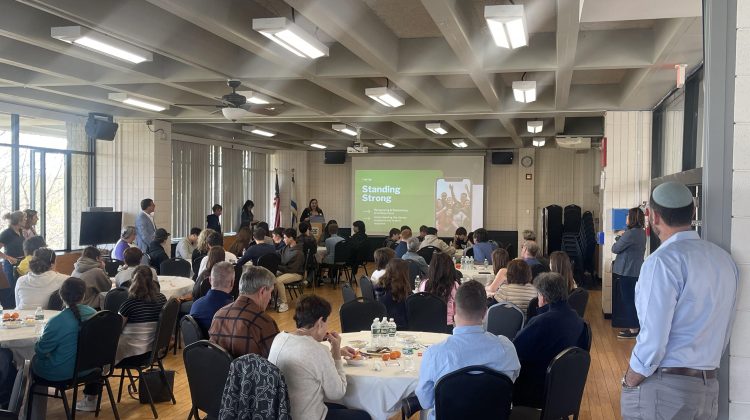MARBLEHEAD – Students and adults gathered at the Jewish Community Center of the North Shore to attend an event called Standing Strong: Empowering Teens to Recognize and Respond to Antisemitism hosted by TribeTalk, an organization dedicated to preparing students and young adults for Jewish life on college campuses and beyond.
The North Shore Antisemitism Task Force, along with several other Jewish organizations in the region, contributed to the creation of the event where Robin Friedman, one of the founders of TribeTalk, spoke about how students can respond to antisemitism that they might encounter in their daily lives, especially when they go to college, and how they can recognize it.
“Now is the time to stand up against antisemitism and bigotry of any kind,” Task Force Chair Sarah Plymate said.
At the event, students were given packets that contain scenarios which according to TribeTalk, are based on true stories. One example is an incident on the North Shore where a student shared an image of a swastika to a large number of people during a school assembly through AirDrop. The students were then encouraged to discuss among their peers on how they would respond and deal with the situation.
Some of the ways Friedman encouraged students to act when they encounter antisemitism include reporting threats to police, organizing events with like-minded students to condemn the incident, and by reaching out to their parents or Jewish organizations in schools for guidance. Friedman also recommended reaching out to hotlines of Jewish organizations. Friedman mentioned a hotline called the Campus Antisemitism Legal Line, launched late last year through a collaboration between Hillel International, the Anti-Defamation League and two law firms.
One of the attendees was Essex County District Attorney Paul Tucker, who said that it was important for him and his office to hear from the people who are impacted by antisemitism, hate speech and the rise in hate crimes that they’re seeing.
“This is extremely important and timely given what’s happening not only in our community, in the country, and across the world,” Tucker said. “It’s important to understand exactly how people are feeling, and what we can do to bring some resolve to combating these hate crimes and hate speech.”
Friedman also said that to prepare for the presentation, she went to the encampments set up at Harvard University, Tufts University, the Massachusetts Institute of Technology, and Emerson College this week, where students are protesting the war in Gaza.
“I talked to the students that were protesting so that I could understand what they were protesting and so that I could communicate that to the students here and so that I could see if there was anything substantive that I needed to change in my presentation based on what they told me,” Friedman said. “But what I learned was that most of those students do not have any idea what they’re protesting, they don’t know anything about the region, they don’t know the history, and they’re protesting because it’s the thing to do socially right now and that was actually very upsetting to me.”
Throughout the presentation, Friedman clarified to students that not everyone who goes to college will experience antisemitism, and that antisemitism affects students differently.
“There are antisemitic things going on in colleges right now, that doesn’t mean you’re not going to go and have a great time and have a really meaningful Jewish life on college campus,” Friedman said.
In the end, Friedman encouraged students to attend Jewish events on campus when they go to college, and to think about what would be meaningful for them in terms of Jewish life when choosing which college to go to, whether that’s joining Jewish fraternities or sororities, getting involved with organizations that tackle food insecurity, or by going to Shabbat dinner.

